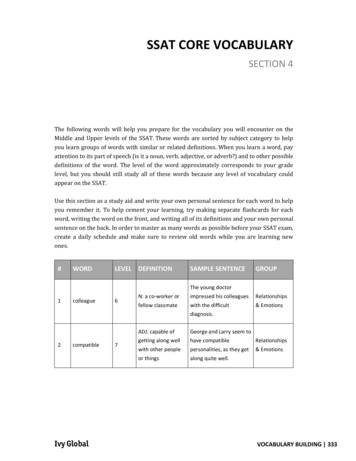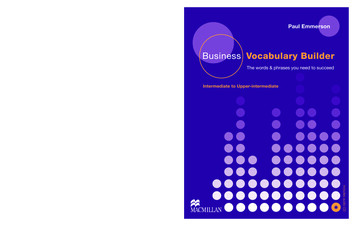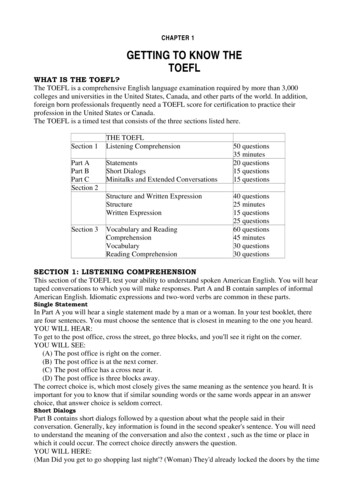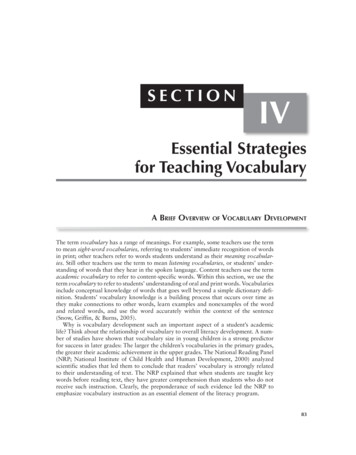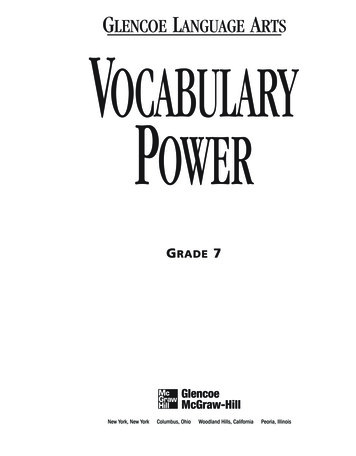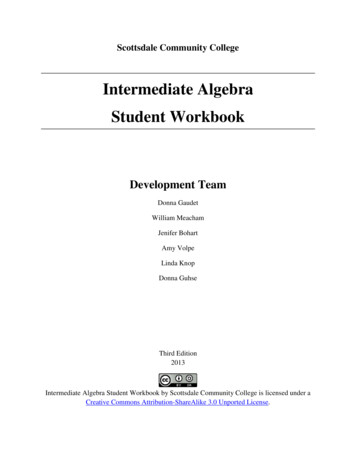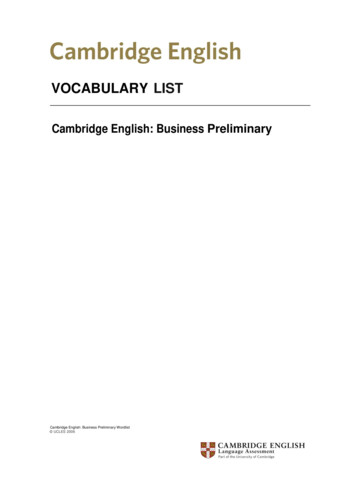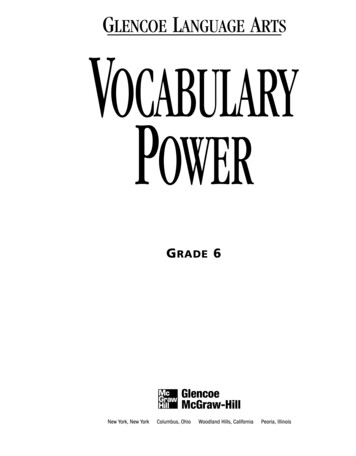
Transcription
GLENCOE LANGUAGE ARTSVOCABULARYPOWERG RADE 6
To the StudentThis Vocabulary Power workbook gives you the practice you need to expand your vocabularyand improve your ability to understand what you read. Each lesson focuses on a singlevocabulary concept or on a theme that ties together the list of words in the Word Bank. Youthen have several opportunities to learn the words by completing exercises on definitions,context clues, and word parts.You can keep track of your own progress and achievement in vocabulary study by usingthe Student Progress Chart, which appears on page v. With your teacher’s help, you can scoreyour work on any lesson or test. After you know your score, use the Scoring Scale on pagesvi–vii to figure your percentage. Then mark your score (or percentage correct) on the StudentProgress Chart. Share your Progress Chart with your parents or guardians as your teacherdirects.Glencoe/McGraw-HillCopyright by The McGraw-Hill Companies, Inc. All rights reserved. Except as permitted under the United StatesCopyright Act of 1976, no part of this publication may be reproduced or distributed in any form or means, orstored in a database or retrieval system, without the prior written permission of the publisher.Send all inquiries to:Glencoe/McGraw-Hill8787 Orion PlaceColumbus, Ohio 43240ISBN 0-07-826224-0Printed in the United States of America1 2 3 4 5 6 7 8 9 10 024 05 04 03 02 01
CONTENTSStudent Progress Chart . . . . . . . . . . . . . . . . . . . . . . . . . . . . . . . . . . . . . . . . . . . . . . . . . . . . . . .vScoring Scale . . . . . . . . . . . . . . . . . . . . . . . . . . . . . . . . . . . . . . . . . . . . . . . . . . . . . . . . . . . . . .viUnit 1Lesson 1Lesson 2Lesson 3Lesson 4ReviewTestUsing Context Clues . . . . . . . . . . . . . . . . . . . . . . . . . . . . . . . . . . . . . . . . . . . . .1The Prefixes em- and en- . . . . . . . . . . . . . . . . . . . . . . . . . . . . . . . . . . . . . . . . .3Using Synonyms . . . . . . . . . . . . . . . . . . . . . . . . . . . . . . . . . . . . . . . . . . . . . . . .5Using Reference Skills—Using a Thesaurus . . . . . . . . . . . . . . . . . . . . . . . . . . . .7. . . . . . . . . . . . . . . . . . . . . . . . . . . . . . . . . . . . . . . . . . . . . . . . . . . . . . . . . . . . .8. . . . . . . . . . . . . . . . . . . . . . . . . . . . . . . . . . . . . . . . . . . . . . . . . . . . . . . . . . . . .9Unit 2Lesson 5Lesson 6Lesson 7Lesson 8Lesson 9ReviewTestUsing Context Clues . . . . . . . . . . . . . . . . . . . . . . . . . . . . . . . . . . . . . . . . . . . .11The Word Roots homo, humanus, anima, animus, anthropo, and bio . . . . .13Word Usage . . . . . . . . . . . . . . . . . . . . . . . . . . . . . . . . . . . . . . . . . . . . . . . . . .15The Latin Roots movere and mobilis . . . . . . . . . . . . . . . . . . . . . . . . . . . . . . .17Using Reading Skills—Using Context Clues . . . . . . . . . . . . . . . . . . . . . . . . . . .19. . . . . . . . . . . . . . . . . . . . . . . . . . . . . . . . . . . . . . . . . . . . . . . . . . . . . . . . . . . .20. . . . . . . . . . . . . . . . . . . . . . . . . . . . . . . . . . . . . . . . . . . . . . . . . . . . . . . . . . . .21Unit 3Copyright by The McGraw-Hill Companies, Inc.Lesson 10Lesson 11Lesson 12Lesson 13ReviewTestUsage . . . . . . . . . . . . . . . . . . . . . . . . . . . . . . . . . . . . . . . . . . . . . . . . . . . . . . .23Usage . . . . . . . . . . . . . . . . . . . . . . . . . . . . . . . . . . . . . . . . . . . . . . . . . . . . . . .25The Latin Roots scribere and signare . . . . . . . . . . . . . . . . . . . . . . . . . . . . . . .27Using Reference Skills—Finding the Right Definition . . . . . . . . . . . . . . . . . . .29. . . . . . . . . . . . . . . . . . . . . . . . . . . . . . . . . . . . . . . . . . . . . . . . . . . . . . . . . . . .30. . . . . . . . . . . . . . . . . . . . . . . . . . . . . . . . . . . . . . . . . . . . . . . . . . . . . . . . . . . .31Unit 4Lesson 14Lesson 15Lesson 16Lesson 17ReviewTestUsing Synonyms . . . . . . . . . . . . . . . . . . . . . . . . . . . . . . . . . . . . . . . . . . . . . . .33The Latin Root verto . . . . . . . . . . . . . . . . . . . . . . . . . . . . . . . . . . . . . . . . . . . .35The Prefix de- . . . . . . . . . . . . . . . . . . . . . . . . . . . . . . . . . . . . . . . . . . . . . . . . .37Using Reading Skills—Understanding Homophones . . . . . . . . . . . . . . . . . . . .39. . . . . . . . . . . . . . . . . . . . . . . . . . . . . . . . . . . . . . . . . . . . . . . . . . . . . . . . . . . .40. . . . . . . . . . . . . . . . . . . . . . . . . . . . . . . . . . . . . . . . . . . . . . . . . . . . . . . . . . . .41Unit 5Lesson 18Lesson 19Lesson 20Lesson 21ReviewTestUsing Synonyms . . . . . . . . . . . . . . . . . . . . . . . . . . . . . . . . . . . . . . . . . . . . . . .43Sentence Completion . . . . . . . . . . . . . . . . . . . . . . . . . . . . . . . . . . . . . . . . . . .45The Latin Root pendere . . . . . . . . . . . . . . . . . . . . . . . . . . . . . . . . . . . . . . . . .47Using Reading Skills—Understanding Homographs . . . . . . . . . . . . . . . . . . . .49. . . . . . . . . . . . . . . . . . . . . . . . . . . . . . . . . . . . . . . . . . . . . . . . . . . . . . . . . . . .50. . . . . . . . . . . . . . . . . . . . . . . . . . . . . . . . . . . . . . . . . . . . . . . . . . . . . . . . . . . .51
Unit 6Lesson 22Lesson 23Lesson 24Lesson 25Lesson 26ReviewTestUsing Synonyms . . . . . . . . . . . . . . . . . . . . . . . . . . . . . . . . . . . . . . . . . . . . . . .53Usage . . . . . . . . . . . . . . . . . . . . . . . . . . . . . . . . . . . . . . . . . . . . . . . . . . . . . . .55The Prefix dis- . . . . . . . . . . . . . . . . . . . . . . . . . . . . . . . . . . . . . . . . . . . . . . . . .57The Latin Words bene and mal . . . . . . . . . . . . . . . . . . . . . . . . . . . . . . . . . . .59Using Idiomatic Skills—Understanding Idioms . . . . . . . . . . . . . . . . . . . . . . . .61. . . . . . . . . . . . . . . . . . . . . . . . . . . . . . . . . . . . . . . . . . . . . . . . . . . . . . . . . . . .62. . . . . . . . . . . . . . . . . . . . . . . . . . . . . . . . . . . . . . . . . . . . . . . . . . . . . . . . . . . .63Unit 7Lesson 27Lesson 28Lesson 29Lesson 30Lesson 31ReviewTestUsing Synonyms . . . . . . . . . . . . . . . . . . . . . . . . . . . . . . . . . . . . . . . . . . . . . . .65The Prefixes over- and under- . . . . . . . . . . . . . . . . . . . . . . . . . . . . . . . . . . . .67The Prefix re- . . . . . . . . . . . . . . . . . . . . . . . . . . . . . . . . . . . . . . . . . . . . . . . . .69The Latin Root ven . . . . . . . . . . . . . . . . . . . . . . . . . . . . . . . . . . . . . . . . . . . . .71Using Reading Skills—Using Dictionary Respellings . . . . . . . . . . . . . . . . . . . .73. . . . . . . . . . . . . . . . . . . . . . . . . . . . . . . . . . . . . . . . . . . . . . . . . . . . . . . . . . . .74. . . . . . . . . . . . . . . . . . . . . . . . . . . . . . . . . . . . . . . . . . . . . . . . . . . . . . . . . . . .75Unit 8Lesson 32Lesson 33Lesson 34Lesson 35ReviewTestUsing Synonyms . . . . . . . . . . . . . . . . . . . . . . . . . . . . . . . . . . . . . . . . . . . . . . .77The Latin Roots specere and species . . . . . . . . . . . . . . . . . . . . . . . . . . . . . . .79The Latin Root tempus and the Greek Root chronos . . . . . . . . . . . . . . . . . . .81Using Reading Skills—Using Base Words . . . . . . . . . . . . . . . . . . . . . . . . . . . .83. . . . . . . . . . . . . . . . . . . . . . . . . . . . . . . . . . . . . . . . . . . . . . . . . . . . . . . . . . . .84. . . . . . . . . . . . . . . . . . . . . . . . . . . . . . . . . . . . . . . . . . . . . . . . . . . . . . . . . . . .85Pronunciation Guide . . . . . . . . . . . . . . . . . . . . . . . . . . . . . . . . . . . . . . . . . . . . . . . . . . . . . . . . .87Copyright by The McGraw-Hill Companies, Inc.
STUDENT PROGRESS CHARTFill in the chart below with your scores, using the scoring scale on the next page.Name:LessonUnit ReviewUnit TestCopyright by The McGraw-Hill Companies, ulary PowerGrade 6v
SCORING SCALEUse this scale to find your score. Line up the number of items with the number correct. For example, if 15out of 16 items are correct, the score is 93.7 percent (see grayed area).Number of ItemsNumber 132.92.92.82.72.62.62.5Grade .764.562.560.658.857.155.65452.651.350Vocabulary PowerCopyright by The McGraw-Hill Companies, 728293031323334353637383940
Copyright by The McGraw-Hill Companies, Inc.Number of ItemsNumber .989.587.28510097.294.692.189.787.5Vocabulary Power363738394010097.3 10094.7 97.3 10092.3 94.9 97.4 10090 92.5 95 97.5 100Grade 6vii
Name Date Lesson 1Class Using Context CluesSometimes, we face new situations away from the comfort of our homes and families. Have you everhad to face an uncomfortable situation, wishing it were over before it started? Maybe your familymoved, and you had to go to a new school where you didn’t know anyone. Or perhaps you had to goto the dentist to get a filling for the first time. The words in the following list have to do with the feelingsthat you might have or actions you might take as you experience a new or uncomfortable situation.Word nguniquebewildermenthostileEXERCISE AContext CluesFill in the blanks below with words from the list that best fit. Double-check your answersby looking up the meanings of these words in a dictionary.1. The purple mouse with orange polka dots is definitely a(n) toy.2. I looked on in , hoping to see the new toy.3. Trisha didn’t like the looks Lucy was giving her.Copyright by The McGraw-Hill Companies, Inc.4. The fire went off because I burned the bacon.5. Sally began to the restrictions of her hospital stay.6. We looked on in as the car salesman yelled at the car he was trying to sell.7. How can we with students who won’t sit still in class?8. I respect the of Americans in the Revolutionary War.9. He felt a for not taking Janet to the park.10. The monk himself by penance and fasting.EXERCISE BUsageIf the boldfaced word is used correctly in the sentence, write correct above it. If not, drawa line through the word and write the correct vocabulary word above it.1. The scientist was excited when he discovered a hostile kind of rock.Vocabulary PowerUnit 1, Lesson 11
Name Date Class continued2. With the bases loaded, the fans waited with great anticipation as their team’s best batter steppedup to the plate.3. He could tell from the mortified faces in the crowd that he was unwelcome.4. The girls resent their classmates for telling on them.5. The teacher realized that the students did not understand the question when she saw the look ofdefiance in their eyes.EXERCISE CMultiple-Meaning WordsSeveral of the words in the list have more than one meaning. Fill in the word that bestcompletes each sentence below. In the space provided to the left, write in the number ofthe definition that helped you make your choice.hostile adj. 1. of or having to do with an enemy 2. unfriendly, opposed. n. 3. an enemy; a hostile personpang n. 1. a sudden, short, piercing pain 2. a sharp, sudden feelinganticipation n. 1 act of looking forward to; expectation 2. a prior action that takes into account a later actionalarm: n. 1. a call to arms 2. a signal 3. sudden, sharp apprehension resulting from the perception ofimminent danger1. The soldiers crouched silently in the bushes, watching in as theenemy troops marched by.rooms in their city’s finest hotel.3. The villagers could tell from the pilot’s uniform and speech that he was a(n)and unwelcome visitor.4. The went off as soon as the driver opened his door.5. The man felt a(n) of regret as he left his homeland.EXERCISE DUsageOn a separate sheet of paper, write sentences in which you use each of the words in thelist correctly. The sentences should show that you understand the word meanings.2Unit 1, Lesson 1Vocabulary PowerCopyright by The McGraw-Hill Companies, Inc.2. In of the governor’s overnight visit, city officials booked a suite of
Name Date Lesson 2Class The Prefixes em- and en-A prefix is added to the beginning of a root or a base word to change its meaning. The prefixes emand en- mean “in” or “into.”Word endorseenvelopemphaticencounterEXERCISE ASynonymsSynonyms are words with similar meanings. Each boldfaced vocabulary word is pairedwith a synonym whose meaning you probably know. Think of other words related to themeaning of the synonym and write your ideas on the line provided. Then, look up thevocabulary word in a dictionary and write its meaning.1. embroider : sewDictionary definition2. emphasize : stressDictionary definitionCopyright by The McGraw-Hill Companies, Inc.3. emphatic : forcefulDictionary definition4. employ : hireDictionary definition5. enable : allowDictionary definition6. encounter : meetDictionary definition7. endeavor : tryDictionary definition8. endorse : supportDictionary definitionVocabulary PowerUnit 1, Lesson 23
Name Date Class continued9. engaging : charmingDictionary definition10. envelop : surroundDictionary definitionEXERCISE BMultiple-Meaning WordsSeveral of the words in the list have more than one meaning. Fill in the word that bestcompletes each sentence. In the space to the left, write in the number of the definitionthat helped you make your choice.embroider v. 1. to ornament a piece of material with stitches that create a raised design or pattern 2. tomake an ornament, pattern, or other design on cloth, leather, or other material with needlework 3. toexaggerate; to add untrue details toemploy v. 1. to provide with work and pay wages 2. to use; make use of (someone or something) 3. tooccupy; to engage the attention ofendorse v. 1. to sign one’s name on the back of (a check or other document) to indicate its transfer orto assure that it is paid 2. to express public support or approval of1. The Fraternal Order of Police decided not to any of the candidatesfor mayor in the upcoming election.2. As the company expanded, the owner decided to more people.3. Bricklayers a variety of different tools to build a chimney.to listeners.5. Bank tellers watch people their paychecks every day.EXERCISE CUsageOn a separate sheet of paper, write a letter to a friend in which you use each of the wordsin the word list correctly. Your letter should show that you understand the meaning ofeach vocabulary word.4Unit 1, Lesson 2Vocabulary PowerCopyright by The McGraw-Hill Companies, Inc.4. Sometimes, people stories to make them sound more interesting
Name Date Lesson 3Class Using SynonymsHome means different things to different people. It may mean the community we live in, our house orapartment, or anywhere we feel at home. The following words have to do with the place we call home.Word sidentvicinitydwellnurtureEXERCISE ASynonymsEach boldfaced vocabulary word is paired with a synonym whose meaning you probablyknow. Think of other words related to the meaning of the synonym and write them on theline provided. Then, look up the vocabulary word in a dictionary and write its meaning.1. abide : tolerateDictionary definition2. communal : publicDictionary definition3. dwell : liveCopyright by The McGraw-Hill Companies, Inc.Dictionary definition4. edifice : buildingDictionary definition5. kindred : familyDictionary definition6. nurture : fosterDictionary definition7. reliance : dependenceDictionary definition8. resident : occupantDictionary definitionVocabulary PowerUnit 1, Lesson 35
Name Date Class continued9. sentiment : feelingDictionary definition10. vicinity : neighborhoodDictionary definitionEXERCISE BAntonymsWrite the vocabulary word that is most nearly opposite in meaning.1. unrelated2. independence3. private4. neglectEXERCISE CEtymologyLatin is the origin of some words on the vocabulary list. For each Latin word given below,the definition has been provided. Write the vocabulary word that comes from the Latinroot. Then, add another word that might be related to the same root. Check your wordchoices in the dictionary.2. communis: common3. vicinis: neighborhood4. nutrire: to suckle, nourish5. sentir: to perceive, to feel6. religare: to tie back7. aedificare: to make a dwellingEXERCISE DWord IllustrationsThink about how the vocabulary words in this lesson relate to your idea of home. On aseparate sheet of paper, draw a picture that illustrates the meaning of one or two of thewords. Then, write a caption for your drawing, using the words you chose.6Unit 1, Lesson 3Vocabulary PowerCopyright by The McGraw-Hill Companies, Inc.1. residere: to sit back, remain
Name Date Lesson 4Class Using Reference SkillsUsing a ThesaurusHave you ever struggled to think of just the right word but couldn’t find it in a dictionary? A thesaurus couldhelp you. A thesaurus, which looks like a dictionary and contains lists of words like a dictionary, contains adifferent kind of information. Whereas a dictionary gives definitions, a thesaurus provides synonyms, orwords with similar meanings, and sometimes supplies antonyms, or words with opposite meanings.A thesaurus may list words in alphabetical order, just like a dictionary, or list words by categoryand provide an alphabetical index at the back. Below is a sample thesaurus entry.sincere adj. candid, open, plain, honest, conscientious, scrupulous, honorable; Antonym: insincere,dishonestEXERCISE AThe word sincere is used in each sentence. Using the sample thesaurus entry above,replace sincere with a synonym that fits better. For each replacement, write a sentenceexplaining your choice.1. She answered in sincere, simple sentences.2. Mary gave sincere, forthright testimony in court.3. The sincere talk show host always told her guests exactly how she felt.4. Acknowledging defeat was the sincere thing to do.Copyright by The McGraw-Hill Companies, Inc.EXERCISE BList five words or phrases that are synonyms of the word mighty. Use a thesaurus.1.2.3.4.5.Vocabulary PowerUnit 1, Lesson 47
Name Date Class Review: Unit 1EXERCISECircle the letter of the word that best completes the sentence.1. When a person is confused, he or she is in a state of .a. endeavorb. anticipationc. nurtured. bewilderment2. If you resent a decrease in your allowance, you may be .a. hostileb. emphaticc. mortifiedd. engaging3. Growing up requires the ability to .a. emphasizeb. embroiderc. endorsed. cope4. Self- is an important quality to develop.a. relianceb. anticipationc. defianced. bewilderment5. When the sounded, the students filed out.a. pangb. kindredc. alarmd. edifice6. A church is an example of a(n) .a. residentb. edificec. vicinityd. sentiment7. Opposition to the dam project helped join the townspeople in a(n) cause.a. communalb. uniquec. emphaticd. mortifiedd. employ9. In of victory, the candidate threw a party.a. bewilderment b. defiancec. alarmd. anticipationCopyright by The McGraw-Hill Companies, Inc.8. He was surprised to poverty in a rich city.a. envelopb. endeavorc. encounter10. Going alone to Europe was a(n) experience for her.a. communalb. emphaticc. uniqued. mortified8Unit 1 ReviewVocabulary Power
Name Date Class Test: Unit 1PART ACircle the letter of the word that best completes the sentence.1. The lieutenant thought that it was a bad idea to enter territory.a. emphaticb. hostilec. communald. mortified2. The two were so much alike that everyone called them spirits.a. hostileb. edificec. kindredd. resident3. The crime took place in the of Oak Road and West Avenue.a. vicinityb. sentimentc. relianced. anticipation4. The mail carrier many different people as she walked her route.a. endeavoredb. dwelledc. enabledd. encountered5. The company two new computer technicians.a. resentedb. employedc. enabledd. coped6. During the debate, the most popular mayoral candidate the issue of education.a. nurturedb. envelopedc. emphasizedd. endeavoredCopyright by The McGraw-Hill Companies, Inc.7. She bought a new outfit in of her dinner date.a. defianceb. reliancec. bewildermentd. anticipation8. The audience responded positively to the speaker’s smile.a. engagingb. emphaticc. communald. hostile9. The writer the criticism leveled at his book.a. employedb. envelopedc. resented10. To show her , the girl refused to eat her supper.a. bewilderment b. vicinityc. defianced. enabledd. reliancePART BCircle the letter of the best answer to each question.1. What is an example of your ability to cope with a conflict in a friendship?a. avoiding your friendb. asking for a chance to talk out the situation, in the presence of a counselor, if need bec. creating a scened. gossiping behind your friend’s backVocabulary PowerUnit 1 Test9
Name Date Class continued2. What is a synonym for mortified?a. embarrassedb. embalmedc. embracedd. embroidered3. What might alarm a person?a. a rainbowb. a friendly letterc. a sunny dayd. a sudden loud noise4. How would a person be likely to react to a bewildering situation?a. with pityc. with puzzlementb. with angerd. with joy5. What is an example of emphatic language?a. Well, maybe so.b. No! Definitely not!c. Perhaps.d. I imagine.6. Which of the following is an edifice?a. a swift currentb. a Web sitec. a candy counterd. a law buildingPART CCircle the letter of the word that is most nearly opposite in meaning.b. neglectc. understandd. limit2. defiancea. obedienceb. challengec. angerd. sadness3. endorsea. supportb. relatec. recommendd. criticize4. communala. equalb. holyc. privated. shared10Unit 1 TestCopyright by The McGraw-Hill Companies, Inc.1. nurturea. promoteVocabulary Power
Name Date Lesson 5Class Using Context CluesAlthough animals are different from human beings in many ways, they also share many traits. Thewords in the following list deal with animals and their personalities, movements, and habitats. Don’t besurprised, though, if the words can apply to humans too!Word defelinelairEXERCISE AContext CluesStudy the paragraphs below. Fill in each blank with the word that best fits from the list.Double-check your answers by looking up the meanings of these words in a dictionary.Always scorning people and her food, Princess the cat is known for being .This morning she emerges from her —a cardboard box filled with soft blankets—and scrutinizes her surroundings.Her owner begins to papers at his desk. Then, he spots his cat and tries toher toward him with a bowl of milk. Princess ignores him and watches that dumbCopyright by The McGraw-Hill Companies, Inc.dog Dino trot past her, his quick and impatient. Panting, his tongue hanging out,Dino pads over to the aquarium to watch the turtle and other creatures.Princess doesn’t feel like playing any of her tricks on Dino. Instead, she decidesto in the corner next to the door, waiting for her opportunity to escape the houseand be alone, for the one thing that this loves is her .EXERCISE BSynonymsFor each group of words and phrases, write the vocabulary word that best fits.1. watery, oceanic, marine2. tempt, entice, attract3. proud, scornful, arrogant4. clever, sly, tricky5. sneak, slink, lie in waitVocabulary PowerUnit 2, Lesson 511
Name Date Class continuedEXERCISE CMultiple-Meanings WordsSeveral of the words in the list have more than one meaning. The word shuffle is anexample. Study the meanings listed below for shuffle and read the sentences that follow.Determine which meaning of the word is correct for each sentence and, to the left, writein the number of that definition.shuffle v. 1. to move about this way and that; mix 2. to rearrange so as to place in random order, as adeck of cards 3. to walk with a dragging step 4. to perform, as a dance, with a dragging motion of thefeet. 5. to move back and forth from one place to another1. The magician shuffled the cards before asking the visitor to choose one.2. The banker shuffled the accounts from Chicago to Switzerland.3. Grandfather shuffled over to the kitchen sink to get a drink of water.4. The businessman shuffled the memos on his desk as he talked to a client.5. The tap dancers shuffled along the stage in time with the music.EXERCISE DUsageIf the boldfaced word is used correctly in the sentence, write correct above it. If not, drawa line through the word and write the correct vocabulary word above it.1. The dancers in the musical Cats moved with feline grace.2. The lion emerged from his gait, rested and ready to hunt.4. The policeman walked to the scene of the crime with a strong and steady shuffle.5. The store owners lurk potential customers away from their competitors with lower prices and freehot dogs.EXERCISE EWord IllustrationsThink about how the vocabulary words in this list describe or relate to one or twoparticular animals. On a separate sheet of paper, draw a picture that illustrates themeaning of one or two of the words. Then, write a caption for your drawing using thewor
This Vocabulary Power workbook gives you the practice you need to expand your vocabulary and improve your ability to understand what you read. Each lesson focuses on a single vocabulary concept or on a theme t
